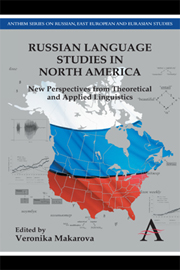Introduction
Published online by Cambridge University Press: 05 November 2012
Summary
This book is a unique collection of research papers representing current directions in Russian language studies in Canada and the United States. The book is integrated thematically by its focus on Russian language structure and dynamics, as well as by the regional themes pertinent to the maintenance and acquisition of the Russian language in the US and Canada. Traditionally, Slavic and Russian studies in these countries have involved mostly literature, history, politics and culture. This collection of research papers reflects recent changes in Russian studies with a focus on language structure, language use, pedagogy and teaching methodology. At least four major trends are responsible for these changes.
First, the rapid economic and social changes in Russia that occurred after the collapse of the Soviet Union in combination with the development of information technology have trigged an unprecedented change in the language structure and use, which now attracts the attention of linguists (e.g., Ryazanova-Clarke and Wade 1999). The lexical system of modern Russian is characterized “by an increased instability of the boundaries between the centre and the periphery” (Ryazanova-Clarke and Wade 1999, 75), i.e., some words from the periphery are moving into the center, while some central words are marginalized. Words change their meanings and undergo re-connotation; the morphological word formation system is extremely active; new loan words appear in abundance; and the grammatical system registers changes in preposition use, acquires a larger class of indeclinables and displays a growing tendency towards analyticity (Ryazanova-Clarke and Wade 1999).
- Type
- Chapter
- Information
- Russian Language Studies in North AmericaNew Perspectives from Theoretical and Applied Linguistics, pp. xi - xxPublisher: Anthem PressPrint publication year: 2012
- 1
- Cited by

